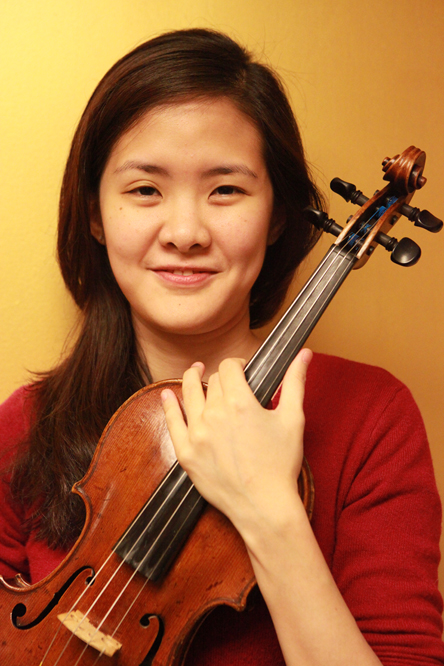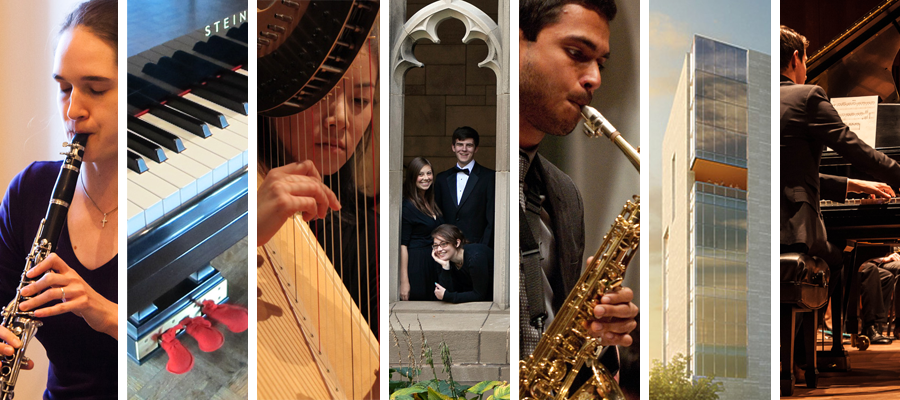 On Saturday, December 1 at 8PM in Mandel Hall, Samantha Fan (left), 2012 Concerto Competition Co-Winner, will perform Bruch’s masterpiece, the Violin Concerto No. 1 in G minor. Read more
On Saturday, December 1 at 8PM in Mandel Hall, Samantha Fan (left), 2012 Concerto Competition Co-Winner, will perform Bruch’s masterpiece, the Violin Concerto No. 1 in G minor. Read more
Where are you from, originally? What drew you to the University of Chicago?
I was born in Singapore but my family moved to Toronto, Canada when I was 16. My parents were both full-time professional violinists with the Singapore Symphony Orchestra so my sisters and I practically grew up backstage of the concert hall.
I chose to pursue my graduate work at the University of Chicago primarily because my research interests coincide with those of my adviser, Dr. Katherine Kinzler, who is currently part of the faculty at the Department of Psychology here at the University.
Even as a busy PhD student in the Psychology Department, you have managed to continue your musical studies as well. How do you manage to balance your academic work with your musical endeavors?
I get this question a lot from people around me. I will have to credit my parents for my ability to perform this juggling act. They started us very early on both the piano and violin and instilled the kind of discipline that I have, to this day, applied religiously when it comes to time management. Personally, work and music have always intertwined for as early as I can remember. The upside of this (when it works) is that I get to enjoy being highly productive. The downside of it is I don’t really have time for anything else outside of work and music.
What are some of your current research interests in your field (psychology)? Do you find any connections or crossover between your academic and musical pursuits or does one compliment the other in any way?
My research interests center on language and its influence on how children reason about social categories and groups. As a violinist, I have always held strongly to the belief that music is the universal language of life. It is by far the only means of communication that is able to bypass all human barriers when it comes to racial differences. In music, it is critical that a child starts learning early in life; is there a parallel in the influence of cultural beliefs imparted from young? I am intensely aware of the effect of music on my life, and I find it fascinating to consider the similar impacts of early cultural beliefs on a person’s consequent understanding of culture differences. At the same time, I have always been curious about the malleability of human prejudice. If one is exposed from an early age to different cultures, could this actually help develop a form of resilient shield toward later influences and prejudices? Or more specifically, would knowledge of different languages help initiate a better understanding of the differences among cultures, and allow underlying cultural similarities to surface?
How long have you studied the violin? Have you always had a special interest in chamber music?
I started playing the violin when I was 5. My earliest memory of chamber music was working with my sister (who’s currently a neurologist resident at Northwestern and an excellent pianist) on violin sonatas so I’ve always considered chamber music to be the most intimate form of music collaboration. Prior to moving to Chicago, I’ve been a member of both a chamber orchestra (the Koffler Chamber Orchestra, conductor Jacques Israelievitch who is also my violin teacher) and a symphony orchestra (Orchestra Toronto where I was assistant concertmaster for 3 years). Needless to say, I’ve had the privilege of collaborating with many fine musicians, particularly on chamber music. Working on these pieces (or as I like to call them “jamming sessions”) was always something I enjoyed tremendously not only because I get to expand my chamber repertoire, but also because of the joy of being able to sight-read and learn a piece together (not to mention the excellent food and drinks that usually come after as well).
Interview by Julia Tobiska, Performance Program Assistant
